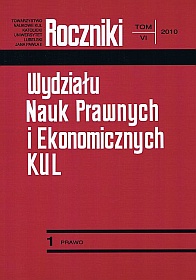Karne usuniecie ze stanu duchownego w rozumieniu Kodeksu Prawa Kanonicznego z 25 stycznia 1983 i Listu Kongregacji do spraw Duchowieństwa z 18 kwietnia 2009
Abstrakt
The Code of Canon Law in can. 219 guarantees the basic right which lays down that every faithful in the Church has the opportunity to choose the state of life. One of them is the state of clergy. This right cannot be removed. In spite of this the canon law foresees situations when a priest can be dismissed from the clerical state.
However, the circumstances in which the dismissal can take place have not been clear. Particularly, two problems have come into consideration. On the one hand, the particular care of the lawgiver assumed that the dismissal from the clerical state could not be done in an arbitral way. On the other hand, he was afraid that the possibility of using this juridical tool by ordinaries would result in abuses. Although the judicial process seemed to be inconvenient and time consuming, it turned out that it was always preferable.
The Letter of Congregation of the Clergy from the year 2009 partially relates to the aforementioned questions. The Holy See searched for the cases of presbyteries staying in serious irregularity of their lives and came to conclusion that the dismissal from the clerical state would be the only possible solution for the problem. The Congregation of the Clergy has quoted the special faculty, received from the Bishop of Rome, regarding dismissing the priests committing canonical crimes, mainly against celibacy. After the promulgation of the Letter, the penalty of dismissal has not change its category in the canonical order. The punishment remains, still, optional and should be applicable only in the case of necessity. Before a priest is dismissed, the ordinaries are obligated to apply all known means of the pastoral care.
Bibliografia
Bączkowicz F., Prawo kanoniczne. Podręcznik dla duchowieństwa, t. I, Opole 1957.
Green T., Delicts and penalties in general, [w:] New Commentary on the Code of Canon Law, red. J. P. Beal, J. A. Coriden, T. J. Green, New York 2000, s. 1564.
Krukowski J., Sankcje w Kościele, [w:] Komentarz do Kodeksu Prawa Kanonicznego, red. W. Wójcik, J. Krukowski, F. Lempa, Lublin 1987.
Lüdicke K., Heiligungsamt: Busssakrament, [w:] Münstericher Kommentar zum Codex Iuris Canonici, red. K. Lüdicke, Essen: Ludgerus Verlag 1984, 976/1.
Lüdicke K., Unterhaltssicherung für Kleriker, [w:] Münstericher Kommentar zum Codex Iuris Canonici, red. K. Lüdicke, Essen: Ludgerus Verlag 1984, 1350/2.
Mizinski A., Elementy kanonicznego procesu karno-administracyjnego, RNP 13(2003), z. 2, s. 127-159.
Reinhardt H., Verlust des Klerikerstandes. Folgen, [w:] Münstericher Kommentar zum Codex Iuris Canonici, red. K. Lüdicke, Essen: Ludgerus Verlag 1984, 290/1.
Reinhardt H., Wiederaufnahme in den Klerikerstand, [w:] Münstericher Kommentar zum Codex Iuris Canonici, red. K. Lüdicke, Essen: Ludgerus Verlag 1984, 293/1.
Reinhardt H., Zölibatspflicht, [w:] Münstericher Kommentar zum Codex Iuris Canonici, red. K. Lüdicke, Essen: Ludgerus Verlag 1984, 277/5.
Schneider F. J., Loss of the clerical state, [w:] New Commentary on the Code of Canon Law, red. J. P. Beal, J. A. Coriden, T. J. Green, New York 2000, s. 390.
Copyright (c) 2010 Roczniki Wydziału Nauk Prawnych i Ekonomicznych KUL

Utwór dostępny jest na licencji Creative Commons Uznanie autorstwa – Użycie niekomercyjne – Bez utworów zależnych 4.0 Międzynarodowe.

